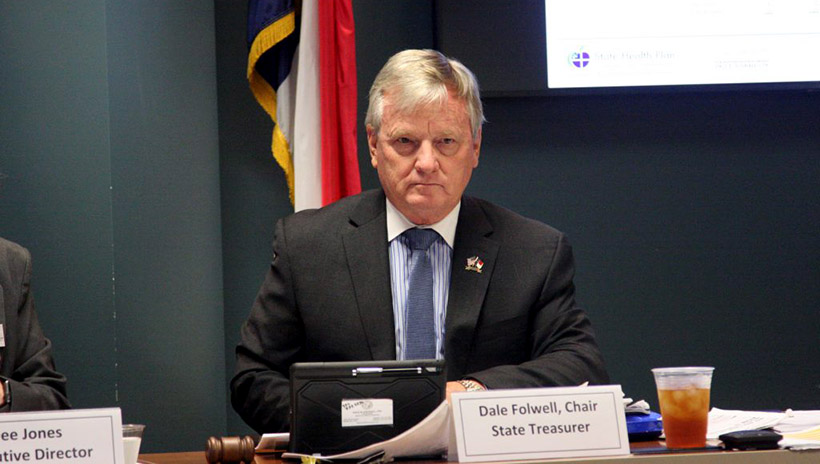Boldly Committed to Truth Telling in the False Face of Fakery
N.C. Treasurer Finding New Ways to Push Hospitals Toward Clear Pricing Project
Publisher's note: This post appears here courtesy of the Carolina Journal, and written by Julie Havlak.

With fiscal forecasts predicting the State Health Plan will go broke in four years, the N.C. treasurer is hatching new tactics to push hospitals into clear pricing.
State Treasurer Dale Folwell has been fighting hospital systems for months. He planned to save the State Health Plan by tethering payments to Medicare rates with his Clear Pricing Project. Deadlines passed, and though he upped reimbursement rates, North Carolina's eight major hospital systems refused to sign on.
When he relented to the hospitals in August, Folwell promised to "go around" their boycott. He now plans to target the hospitals by cracking down on surprise billing and by investigating his legal options with hospitals.
He said his department is searching the country for legal cases where hospitals admitted wrongdoing. He implied he was interested in the nonprofit status of hospitals.
"There are legal things that we are looking at," Folwell said Tuesday, Oct. 1, in his monthly "Ask Me Anything" teleconference. "Any time that there are cartel-like activities going on in any industry for the last 200 years in this country, that's something that legal system needs to look at. And we're doing just that."
Less drastic but more immediate measures include efforts to quash surprise medical billing.
The treasurer plans to ensure patients don't receive surprise medical bills by expanding bundling, which would offer insurers a flat rate for major procedures. The move would save the state money, said John Locke Foundation Health Policy Analyst Jordan Roberts.
"It's like mini referenced-based pricing, saying that they will not nickel-and-dime him for a bunch of different steps in a procedure."
Blue Cross N.C. estimates surprise medical billing costs $14 million a year in higher premiums for its members alone.
"The hidden cost of surprise bills is that because providers know they will get reimbursed for out-of-network payments, there is a lack of incentive for providers to go in-network and be beholden to the negotiated rates," said Michael Kraskin, executive director of N.C. Coalition of Fiscal Health. "If they walk away and charge out-of-network rates, they will still be reimbursed. So, it gives providers the ability to charge higher rates."
Folwell also said he will target split billing - the jargon for making sure patients don't get billed twice for one service.
Folwell said he has seen multiple abuses of split billing, in which patients unwittingly land multiple bills by asking the wrong questions.
"Many of our members get charged for a separate office visit by asking something in the course of a normal well visit," Folwell said. "And there is a separate office visit charged to the State Health Plan for that little conversation."
Of the surprise medical bills dominating the headlines, split billing ranks among the more notorious offenders.
"A parent anecdotally told me that they had a teenager who played soccer, who had two ingrown toenails. They went in to get it fixed. But it was two toes, two facility fees, two big bills, but it was one visit. It was almost like they had gone into the doctor twice," Folwell said. "This is happening hundreds, if not thousands, if not tens of thousands, times a year to the State Health Plan."
In the past, hospitals have retaliated by arguing Folwell's Clear Pricing Project is outdated. A few hospital systems pushed value-based care as the solution to health care's rising costs. Value-based aims to reform the incentives of providers by changing the way the state pays for health care.
Folwell has said he can't make the change to value-based care until he knows the value of the services. His emphasis on "secret contracts" and "cartels" hasn't changed.
"The fact that there is a complete boycott and reluctance to share what people are even paying for health care continues to be completely unacceptable," Folwell said. "There's no turning back. This is the last thing in the U.S. economy where people don't know the value and price of what you're getting."
Go Back

State Treasurer Dale Folwel. | Photo: Carolina Journal
With fiscal forecasts predicting the State Health Plan will go broke in four years, the N.C. treasurer is hatching new tactics to push hospitals into clear pricing.
State Treasurer Dale Folwell has been fighting hospital systems for months. He planned to save the State Health Plan by tethering payments to Medicare rates with his Clear Pricing Project. Deadlines passed, and though he upped reimbursement rates, North Carolina's eight major hospital systems refused to sign on.
When he relented to the hospitals in August, Folwell promised to "go around" their boycott. He now plans to target the hospitals by cracking down on surprise billing and by investigating his legal options with hospitals.
He said his department is searching the country for legal cases where hospitals admitted wrongdoing. He implied he was interested in the nonprofit status of hospitals.
"There are legal things that we are looking at," Folwell said Tuesday, Oct. 1, in his monthly "Ask Me Anything" teleconference. "Any time that there are cartel-like activities going on in any industry for the last 200 years in this country, that's something that legal system needs to look at. And we're doing just that."
Less drastic but more immediate measures include efforts to quash surprise medical billing.
The treasurer plans to ensure patients don't receive surprise medical bills by expanding bundling, which would offer insurers a flat rate for major procedures. The move would save the state money, said John Locke Foundation Health Policy Analyst Jordan Roberts.
"It's like mini referenced-based pricing, saying that they will not nickel-and-dime him for a bunch of different steps in a procedure."
Blue Cross N.C. estimates surprise medical billing costs $14 million a year in higher premiums for its members alone.
"The hidden cost of surprise bills is that because providers know they will get reimbursed for out-of-network payments, there is a lack of incentive for providers to go in-network and be beholden to the negotiated rates," said Michael Kraskin, executive director of N.C. Coalition of Fiscal Health. "If they walk away and charge out-of-network rates, they will still be reimbursed. So, it gives providers the ability to charge higher rates."
Folwell also said he will target split billing - the jargon for making sure patients don't get billed twice for one service.
Folwell said he has seen multiple abuses of split billing, in which patients unwittingly land multiple bills by asking the wrong questions.
"Many of our members get charged for a separate office visit by asking something in the course of a normal well visit," Folwell said. "And there is a separate office visit charged to the State Health Plan for that little conversation."
Of the surprise medical bills dominating the headlines, split billing ranks among the more notorious offenders.
"A parent anecdotally told me that they had a teenager who played soccer, who had two ingrown toenails. They went in to get it fixed. But it was two toes, two facility fees, two big bills, but it was one visit. It was almost like they had gone into the doctor twice," Folwell said. "This is happening hundreds, if not thousands, if not tens of thousands, times a year to the State Health Plan."
In the past, hospitals have retaliated by arguing Folwell's Clear Pricing Project is outdated. A few hospital systems pushed value-based care as the solution to health care's rising costs. Value-based aims to reform the incentives of providers by changing the way the state pays for health care.
Folwell has said he can't make the change to value-based care until he knows the value of the services. His emphasis on "secret contracts" and "cartels" hasn't changed.
"The fact that there is a complete boycott and reluctance to share what people are even paying for health care continues to be completely unacceptable," Folwell said. "There's no turning back. This is the last thing in the U.S. economy where people don't know the value and price of what you're getting."
| Democrat Candidates for U.S. Senate Continue Lurch to the Far Left | Carolina Journal, Editorials, Op-Ed & Politics | Plaintiffs in Redistricting Case Say Court Should Reject House Maps |
Latest Op-Ed & Politics
|
Governor expected to sign into law
Published: Friday, April 26th, 2024 @ 1:48 pm
By: John Steed
|
|
Atheist Soros, although born Jewish, was Nazi collaborator in Hungary in WWII
Published: Friday, April 26th, 2024 @ 11:58 am
By: John Steed
|
|
anti-immigration conservative nationalist beats Social Democrat incumbent 2 to 1
Published: Friday, April 26th, 2024 @ 9:19 am
By: John Steed
|
|
protecting children and parents from gender ideology promoters
Published: Friday, April 26th, 2024 @ 6:45 am
By: John Steed
|
|
Biden wants to push this in public schools and Gov. deSantis says NO
Published: Thursday, April 25th, 2024 @ 9:19 pm
By: John Steed
|
|
eve 45% of Latinos support mass deportation
Published: Thursday, April 25th, 2024 @ 12:40 pm
By: John Steed
|
|
this at the time that pro-Hamas radicals are rioting around the country
Published: Thursday, April 25th, 2024 @ 8:01 am
By: John Steed
|
|
Pro death roundtable
Published: Wednesday, April 24th, 2024 @ 12:39 pm
By: Countrygirl1411
|
|
populist / nationalist anti-immigration AfD most popular party among young voters, CDU second
Published: Wednesday, April 24th, 2024 @ 11:25 am
By: John Steed
|






















